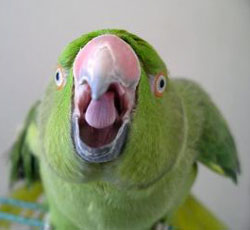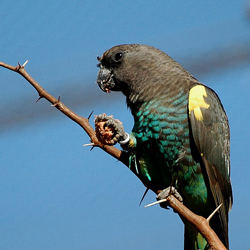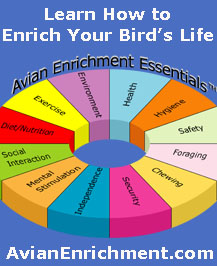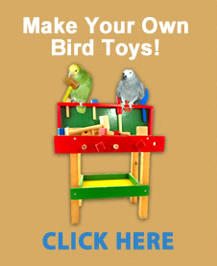|
 Birds use their beaks for a wide variety of tasks, including eating, climbing, exploring and nest excavation. Parrots rarely bite in the wild and when they do it is for defensive reasons. A parrot's first instinct is to flee danger but when they feel cornered or threatened they will bite. Birds use their beaks for a wide variety of tasks, including eating, climbing, exploring and nest excavation. Parrots rarely bite in the wild and when they do it is for defensive reasons. A parrot's first instinct is to flee danger but when they feel cornered or threatened they will bite.
If you observe your parrot closely and are familiar with your bird's body language then you will realize that your bird most often gives fair warning of an impending bite. In captivity, biting is largely a learned behavior that a bird uses to avoid doing something they don't want to do. This behavior arises out of frustration over the fact we fail to recognize and respect the clues they provide to us via vocalizations and subtle changes in body posture and feather position.
Since a bird uses its beak for so many things, one question to ask is, "was it really a bite?" For example:
- Since they use their beaks to explore and their surroundings your bird just might not realize that this exploratory activity may cause discomfort. If your skin is a little red or your bird plucked a few stray hairs, this activity was likely just touching and tasting, not biting.
- Parrots mutually preen each other, this activity is called allopreening and often parrots will preen their favorite human as a sign of affection.
- Parrots often use their beak as a third foot to test the sturdiness of a branch (or your hand) before stepping up.
There are different degrees of "biting":
- Small "nips" and "pinches" are usually because a bird is trying to get your attention about something she wants. These bites usually only leave a small impression and/or redness on the skin.
- Bites that cause minor bruising and small cuts will often result when a bird is reacting out of frustration. Parrots will use slightly more aggressive biting in an attempt to control their environment and the humans in it.
- If your bird leaves a deep bruise or cut and there’s lots of bleeding, this is a "chomp.” These bites can come from a very scared or overwhelmed bird that is protecting itself, its mate or his cage.
A bird will bite if:
- They are fearful of a situation or an unfamiliar individual.
- They feel they need to protect their territory (cage agression).
- They want to be left alone because they are tired, stressed or not feeling well.
- They become over-stimulated by play activities.
- They are hormonal.
To avoid getting bitten:
- Carefully observe and learn to interpret your bird's body language.
- Never force a bird to do something it doesn't want to do.
- Train your bird to respond to the basic commands: "step up", "step down", "NO" and "okay".
If you are bitten:
- Stay calm. Don't react with lots of drama as this "rewards" your bird.
- Put your bird down and give your bird a "time out" by quietly withdrawing all attention for a few minutes. NEVER punish a bird by yelling, hitting or causing any other harm.
- Try analyze the situation from the bird's perspective and determine why the bite happened. Realize that your bird was reacting to something in the environment.
- Avoid similar scenarios in the future (i.e., remove source of fear, change your behavior).
- Don't take it personally, bites are more often than not our fault for being oblivious to our bird's needs and attempts to communicate to us.
|
 Social Time
Social Time
 Why Does My Bird Scream?
Why Does My Bird Scream?
 Understand Your Bird's Body Language
Understand Your Bird's Body Language



































































 Birds use their beaks for a wide variety of tasks, including eating, climbing, exploring and nest excavation. Parrots rarely bite in the wild and when they do it is for defensive reasons. A parrot's first instinct is to flee danger but when they feel cornered or threatened they will bite.
Birds use their beaks for a wide variety of tasks, including eating, climbing, exploring and nest excavation. Parrots rarely bite in the wild and when they do it is for defensive reasons. A parrot's first instinct is to flee danger but when they feel cornered or threatened they will bite.


